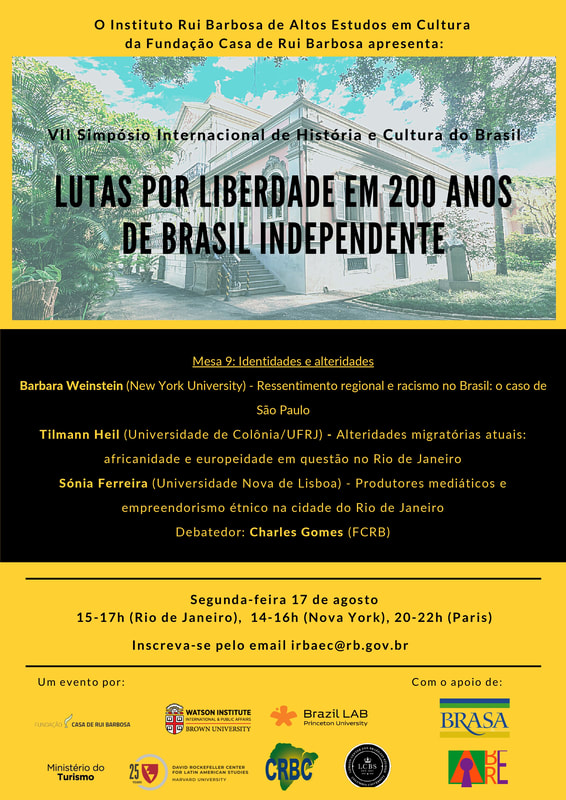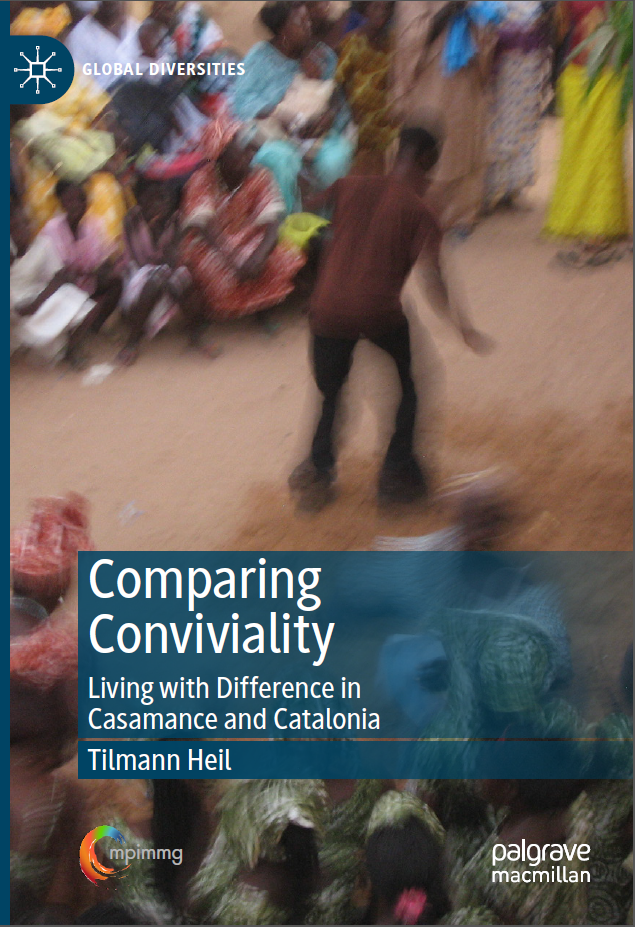|
I will be presenting at the 9th roundtable on "Identities and Alterities" of this international symposium that honors the struggles for freedom in 200 years of an independent Brazil. I will discuss some of the current alterities in Brazli that arise from the recent arrival of West Africans and Southern Europeans in the city of Rio de Janeiro. I will discuss notions of Africanness and Europeanness in my interlocutors' narratives and experiences in Rio de Janeiro and how this discussion facilitates an understanding of some of the complexities of historically grown, currently active social hierarchies and racism in the city. Missed it? Please go and listen to our debate here!
As a key part of my research for the book Comparing Conviviality, I reflect on the differences between me and my interlocutors, my privilege and the commonalities we identified and challenges we faced. The relations we forged throughout the research process and beyond materialized at the intersection of race, origin, class, world view and outlook, among others.
Impressions from the presentation and debate of Comparing Conviviality at the Núcleo Interdisciplinar de Estudos Migratórios (NIEM), IPPUR, Universidade Federal do Rio de Janeiro, in March 2020.
The sound at the beginning and end are from ZigFest in 2010 in Ziguinchor, Senegal which I discuss in Chapter 4: Staged and sensous. If ever you do not have access to the book through your institution, please get in touch.
The book Comparing Conviviality takes the claim to a better knowledge and practice of how to live with difference foreward that Senegalese migrants in Catalonia made. Pursuing such non-hegemonic knowledge during 18-month of multi-sited, ethnographic fieldwork in Casamance, Senegal, and Catalonia, Spain, this quest has led to the formulation of an unstable concept: conviviality.
Impressions from the presentation and debate of Comparing Conviviality at the Núcleo Interdisciplinar de Estudos Migratórios (NIEM), IPPUR, Universidade Federal do Rio de Janeiro, in March 2020.
The sound at the beginning and end are from ZigFest in 2010 in Ziguinchor, Senegal which I discuss in Chapter 4: Staged and sensous. If ever you do not have access to the book through your institution, please get in touch.
My work on migration accross one of the most unequal geographies in the world, the Mediterranean, was driven by the dissatisfaction with how the people were mainly framed: victims, criminals, or undeserving 'bogus' refugees. These debates are often driven by the problem of Europeans to deal with those who are different at their doorstep. My book Comparing Conviviality shifts this debate, engaging with the knowledge of mobile Africans and how they live with difference.
Impressions from the presentation and debate of Comparing Conviviality at the Núcleo Interdisciplinar de Estudos Migratórios (NIEM), IPPUR, Universidade Federal do Rio de Janeiro, in March 2020.
The sound at the beginning and end are from ZigFest in 2010 in Ziguinchor, Senegal which I discuss in Chapter 4: Staged and sensous. If ever you do not have access to the book through your institution, please get in touch. in Migration Studies [Open Access]
with Fran Meissner Abstract In light of current experiences with migration-driven diversification, is it still conducive to think about the effects of international migration by advocating for immigrant integration? This article argues that there are key problems with European uses of immigrant integration logics that cannot be resolved through redefinitions or reappropriations of the term. Even highly refined notions of immigrant integration misconstrue the role and relevance of differences in diversity dynamics. Immigrant integration further risks concealing and perpetuating power dynamics and (colonial) hierarchies. These continue to shape the social relevance of differences. Analytically thinking about superdiversity directs us to paying more attention to disintegration, a notion that cannot be reduced and measured by way of individual or group performance. To be able to usefully engage with disintegration, we argue that it needs to be divorced from ideas about social fragmentation and social collapse. To do this, we draw on recent developments in the literature on conviviality to emphasise the relational practices, power asymmetries, and materialities that enter into negotiations of difference. Convivial disintegration aptly addresses continuously reconfiguring and uncertain social environments. Our article thus provides a deromanticised and enabling provocation for easing integration anxieties.
|


 RSS Feed
RSS Feed